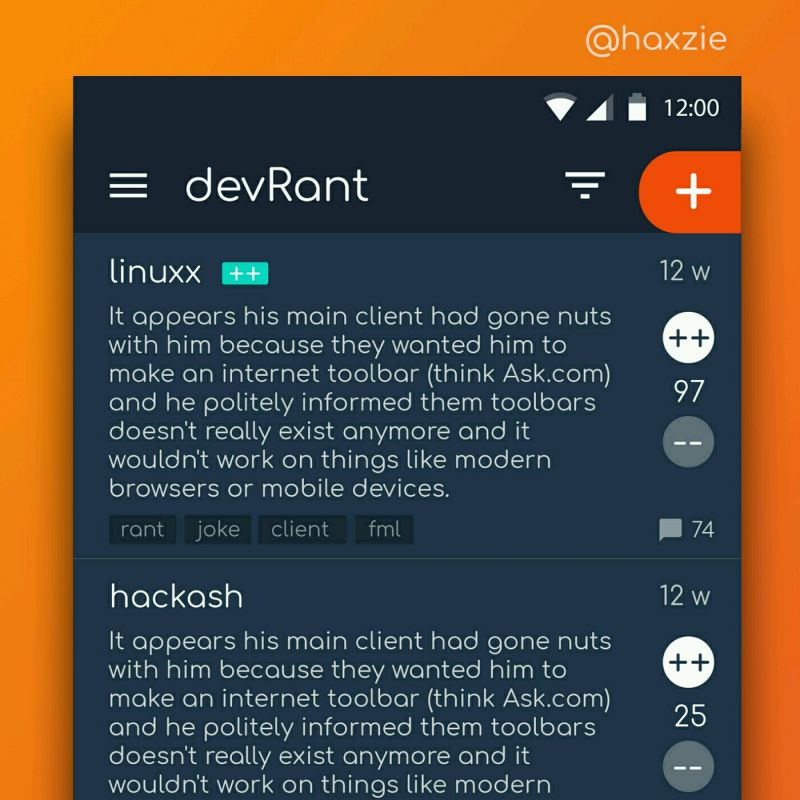Ranter
Join devRant
Do all the things like
++ or -- rants, post your own rants, comment on others' rants and build your customized dev avatar
Sign Up
Pipeless API

From the creators of devRant, Pipeless lets you power real-time personalized recommendations and activity feeds using a simple API
Learn More
Comments
-
Well I'd either put a ?cancel=true after booking ID
Or
Add a status to booking info where I set status to cancel and send a put request where URL ends with booking ID -
Seems like a load of fluff what could literally just be...
DELETE /booking/:reference -
@nblackburn Unless the API is actually deleting the resource and making it unavailable to access from any other calls, DELETE isn't really doing what it says it does.
It seems entirely possible that you might want to be able to cancel a booking, and still store a record of what was cancelled and the reason as to why.
While not the prettiest call, I would argue that there isn't a much better solution that could be implemented.
@gitpush I dont think i have seen a POST /resourceName/:id request implemented before, so I think it would initially catch some people off guard (which any well designed API should not do).
In regards to a PUT request, I see it as being appropriate, as long as there isn't any failable additional processing that occurs when you cancel.
@CurseMeSlowly
The only thing I see as being truly horrific about this API as it is implemented is the fact you provide a micrositeId (which presumably is already part of the booking resource), and the bookingReference (which is already supplied by the url) in the request body
Let me know what you think though. I love a good discussion on API design -
@theaviator I was thinking more that you are effectively deleting a booking but PATCH could be used to update it's status too.
It depends on your thinking so either is correct imo. -
 cursee164388y@theaviator ah I missed the arguments section. Just thought booking/{ref}/cancel is the API and thought that it seems alright to me to do it that way.
cursee164388y@theaviator ah I missed the arguments section. Just thought booking/{ref}/cancel is the API and thought that it seems alright to me to do it that way.
That's why I was a bit confused with this rant. Haha.
And yes, doesn't necessarily need to delete a cancelled booking since the info should still be available to visitors or booking site admins. -
 cursee164388y@JoshBent first time I saw someone -- a bookmark comment. 😂 Revert back to 0 for you 🤣 don't know why I found this funny 😬
cursee164388y@JoshBent first time I saw someone -- a bookmark comment. 😂 Revert back to 0 for you 🤣 don't know why I found this funny 😬 -
@theaviator oh no POST /resourceName/:id = failure! because ID is set by server and not client, post would be /resourceName only.
Agree with the PUT part you mentioned, though I think server should handle what happens when a booking is cancelled IMO and no the client sending another request -
 EAlie608y@theaviator I would be more than happy, if this end point response something like status=true or even some message.
EAlie608y@theaviator I would be more than happy, if this end point response something like status=true or even some message.
There are like 15 endpoints that I am using and most of them have similar issue. Sometimes on success it is a raw text, sometimes its json -
 EAlie608y@CurseMeSlowly @nblackburn @JoshBent @gitpush
EAlie608y@CurseMeSlowly @nblackburn @JoshBent @gitpush
Is it only me who is seeing a problem with the response of this endpoint ? -
@EAlie to be honest I don't think a response body is required as long as it uses correct http status codes.
But in case of errors of course a response body is required with it's correct http code.
And not like fucking Magento, that bitch returns status code 200 and a body that starts with: error 😒😒😒 -
 cursee164388y@EAlie yeah return error properly and it should be enough as @gitpush explained. I applied this concept not only for API calls. As long as there isn't any error msg, it is all fine to continue to next action and show success message.
cursee164388y@EAlie yeah return error properly and it should be enough as @gitpush explained. I applied this concept not only for API calls. As long as there isn't any error msg, it is all fine to continue to next action and show success message. -
 EAlie608y@CurseMeSlowly Either way they are charging shit tons of money for that. around €160/month
EAlie608y@CurseMeSlowly Either way they are charging shit tons of money for that. around €160/month -
 cursee164388y@EAlie and globally it seems. Well that's how to become millionaire. Sell high, ship fast, fix later or never. 🙄
cursee164388y@EAlie and globally it seems. Well that's how to become millionaire. Sell high, ship fast, fix later or never. 🙄
Related Rants

 My friend said an intern designed this UI for an internal site.
No. Just... no
My friend said an intern designed this UI for an internal site.
No. Just... no When the API is not documented.
When the API is not documented. Been looking around ways to improve devrant's user experience a little, Idk whether you guys like it or not.. ...
Been looking around ways to improve devrant's user experience a little, Idk whether you guys like it or not.. ...
How NOT to design an API
¯\_(ツ)_/¯
undefined
design
api